In recent times China has been much on our minds. In this post I’ve collected a number of diverse articles and radio segments bearing on China and our relationship with China which seemed to me interesting. I’m not attempting to deal comprehensively with mess our relationship with China has become.
Visit of Premier Li Keqiang
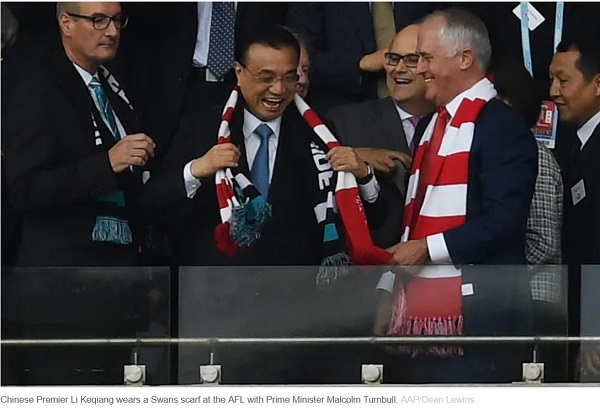
That’s from an article Li Keqiang’s visit a good sign for the China-Australia relationship on 27 March 2017.
Premier Li Keqiang, second only to President Xi Jinping, spent five days in Australia to consolidate the relationship between the two countries.
There were questions, of course, but the relationship looked open, full of promise and working well.
That was then, this is now
Last week the two remaining Australian China-based media journalists, Bill Birtles of the ABC and Michael Smith from the AFR, were flown home, having been interviewed about the detention of Australian citizen and Chinese state media journalist, Cheng Lei, now in indefinite detention amid claims of imperilling Chinese national security.
Birtles did many interviews with ABC programs. The best I heard was with Linda Mottram at ABC RN’s PM. Five years ago he found China a relatively relaxed and open place to work. Now, he said, it was impossible to make a documentary, because of harassment, and because no-one wanted to talk to Australian journalists, with Australia being consistently and comprehensively rubbished on state media.
China our biggest export destination
China is by far our biggest export destination, taking around 30 per cent of our exports.
- In 2017-18 Australia exported $123.3 billion in goods and services to China, equal to about 6.7 per cent of Gross Domestic Product (GDP).
…
There are over 12,000 Australian exporters selling goods to China either directly or via Hong Kong and over 3,000 Australian businesses based there.
Then there is, or was, a significant flow of Chinese students and tourists to our shores.
In November last year Adam Triggs made that 38 per cent and said this:
- It’s true that Australia exports a lot to China — about 38 per cent of its exports. This is far more than to Japan, Australia’s second-largest export destination at around 16 per cent. At roughly AU$144 billion (US$99 billion) a year, exports to China contribute 8 per cent of Australia’s GDP.
Is this a problem? Some fear that these benefits could be at risk if China were to weaponise its trade with Australia as part of a geopolitical dispute, or if the Chinese economy were to suffer a crisis. Luckily, neither is a realistic threat.
As Shiro Armstrong and Peter Drysdale have noted, China has zero strategic interest in weaponising trade against Australia. Yes, Australia is dependent on China, but China is also dependent on Australia. Australia supplies 61 per cent of China’s iron ore, 53 per cent of its coal and 23 per cent of its thermal coal. Australia’s shares in each are increasing.
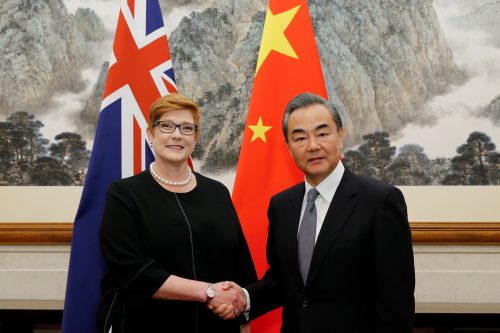
That was Marise Payne, and her counterpart Wang Yi in December 2018
Now it seems the whole relationship has been well and truly weaponised, apart from actual shooting.
Saul Eastlake’s assessment of the Chinese economy
Economist Saul Eslake assesses the strength of the Chinese economy in Is time running out for the Chinese economy? also published later with slight changes at The Conversation as China’s leaders are strong and emboldened. It’s wrong to see them as weak and insecure.
He sees strength and resilience, rather than weakness. However, as an ’emerging’ economy they have been using debt like an ‘advanced’ economy:
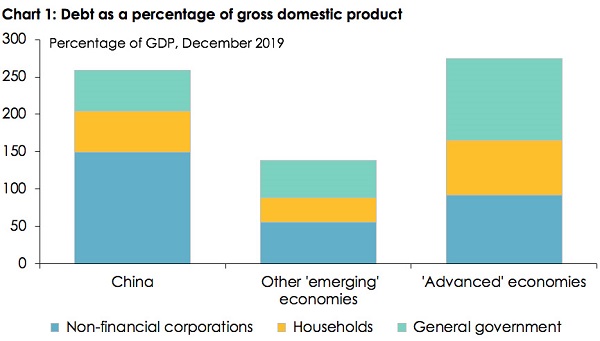
No problem he says because most of that debt is owed by state-owned enterprises to state-owned banks. If a lot of that debt were to turn bad, which is by no means impossible, then they just solve it by writing it off and then recapitalising the state-owned banks by drawing down on the foreign exchange reserves.
Problem is that the foreign exchange reserves have not kept up with the increased debt:
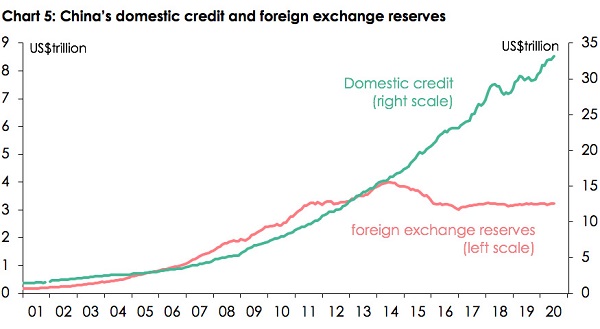
How this is managed, I’ll leave you to read the article, but Eslake thinks their foreign exchange reserves are more than adequate, the main theoretical problem being a flight of capital:
If some occurrence caused a tsunami of capital outflows and the Chinese authorities didn’t have any other ways of stopping it (such as confiscating the assets of, or imprisoning or executing, people who tried to get their money out of the country, something I’m sure they wouldn’t baulk at), then there would be a currency crisis…
Then, he says:
- It’s worth remembering that the lesson the Chinese Communist Party drew from the collapse of the Soviet empire is that once brutal authoritarian regimes have clearly failed to deliver ongoing improvements in people’s well-being, which they promise in return for the surrender of individual freedoms, they can only survive as long as they are willing to kill their own people in sufficient numbers pour encourager les autres, or someone else is willing and able to do it for them.
The Chinese economy keeps powering on, and in large part does so because it is becoming less dependent on the rest of the world:
- In 2019, exports accounted for only 18.4 per cent of China’s GDP (according to World Bank data), down from a peak of 36 per cent in 2006, and less than in any year since 1991. Big economies, like China’s now is, tend to be relatively closed: thus, exports only represent 12 per cent of US GDP and 18.5 per cent of Japan’s (compared with Australia’s 24 per cent, for example).
Whatever dependence they have they will now seek to diversify away from Australia. I believe they are reducing their dependence on our beef, for example, by buying more American beef. Ditto for a number of other products.
World War 2 shapes modern China
Recently Tom Switzer had an interesting conversation with
Rana Mitter on China’s new nationalism. Mitter is an Oxford university historian who has written a book on on how the new Chinese nationalism is being shaped by a re-interpretation of China’s role in World War II.
He points out that the Chinese tied up a million Japanese troops, which may have made a difference to how we fared. It is true that the people who fought the Japanese ended up on Formosa, now called Taiwan. Nevertheless he said that China was in on the ground floor with forming the United nations and helped write the international charter of human rights.
Just to sort out the history, the UN was formed officially in 1945, with 26 signatories who had signed a United Nations Declaration in 1942. China was one of them. The people who fought the Japanese, the Kuomintang under Chiang Kai-shek, retreated to Taiwan in December 1949.
The Universal Declaration of Human Rights was adopted on 10 December 1948. One P. C. Chang of the Republic of China was indeed the Vice Chair of the drafting group.
In drafting the declaration:
- Chang urged removing all references to nature and God to make the document more universal, and used aspects of Confucianism to settle stalemates in negotiations.
Of course, China changed when Mao took over. My knowledge of Mao’s thought is close to zero, but communism was based on a Western philosophy, so it was no surprise that he opposed Confucianism.
Mitter ends up saying that China should get back to cooperating with the rest of the world rather than trying to make it conform to its notion of itself. Something along those lines.
Leaving aside the USA, Rory Medcalf, head of the National Security College at the ANU, says China has now alienated a large number of countries, including Australia, India, Japan, Europe and much of Southeast Asia and the developing world.
It seems, though, that we are being made an example of what happens if we show overt impertinence.
China projects soft power
This segment where Phillip Adams talks to James Tager, Deputy director of free expression research and policy at PEN America, and Sam Voutas, actor and independent filmmaker about Made in Hollywood, censored by China really sent a chill up my spine.
It seems that the big-name American film production houses have become dependent on a large and growing Chinese market. For some time now filmmakers have engaged in self censorship, anticipating what the Chinese censor will strike out. However, now they are being subject to demands that as part of the deal they will include material which tells the Chinese story according to the party line.
China not immune from loneliness epidemic
Even more chilling than that was Adams’ conversation with Noreena Hertz in What happens when a loneliness epidemic meets a pandemic?
Hertz is described as an economist and renowned thought leader, academic and broadcaster. If you check her out on Wikipedia, she clearly does not please everyone and might be described as a precocious radical lefty out of a British business school, one who has a particular gift for self-promotion.
However, she is has a PhD in economics and is not stupid. I recall her commentary around the turn of the century, when she could mix with the powerful elite at cocktails, then throw on jeans and a T-shirt and join with the protesters against global capitalism. That was when anti-capitalist protest choked up cities, before the capitalists started having meetings at places like Dohar and Cancún where the mobs could not go.
I think she could be onto something with her Generation K, a 2015 study of British and American teenagers characterised by:
- anxiety, loneliness, a desire for connection, a desire to co-create, a commitment to societal equality, anti-traditional institutions, commitment to the environment and fear about their own financial futures.
Also:
- Key findings include that this Generation is more anxious than previous ones, more intent on being unique, and more concerned about inequality. She posits that they have been profoundly shaped not only by technology but also by the recession and an increasing sense of existential threat. She writes “unlike those currently aged between 20 and 30, the “Yes we can” generation, who grew up believing the world was their oyster, for Generation K the world is less oyster, more Hobbesian nightmare.”
What really stunned her, she told Adams, was to find a US Ivy League university running courses for students on how to relate to other people, including how to read facial expressions and body language. The university had found that students were so isolated and lonely they couldn’t relate to other humans.
Never fear, the market is rising to meet the need. She found 600 sites where you can rent a friend by the hour. She did just that, had a great time with her companion shopping, then when about to suggest coffee was surprised when her companion looked at her watch, said “times up”, asked for her money, and was gone.
Now here’s the thing – isolation and loneliness is happening in China too.
Hertz puts this down to the outcome of what Marx, Weber and Durkheim were talking about in ‘alienation’ and anomie.
Not helped, of course, by the logic of capitalism, which sees the individual as both the ultimate unit of labor and the target consumer.
Confucius says…
I wondered what Confucius would have said about all this, and in particular about the anger currently displayed by the Chinese. We know the importance of filial duty. Wikipedia gives us this:
- Herbert Fingarette’s conceptualisation of Confucianism as a philosophical system which regards “the secular as sacred”,[6] Confucianism transcends the dichotomy between religion and humanism, considering the ordinary activities of human life—and especially human relationships—as a manifestation of the sacred,[7] because they are the expression of humanity’s moral nature (xìng 性), which has a transcendent anchorage in Heaven (Tiān 天).
Social harmony is central, and I find this of interest:
- The worldly concern of Confucianism rests upon the belief that human beings are fundamentally good, and teachable, improvable, and perfectible through personal and communal endeavor, especially self-cultivation and self-creation. Confucian thought focuses on the cultivation of virtue in a morally organised world. Some of the basic Confucian ethical concepts and practices include rén, yì, and lǐ, and zhì.
Rén (‘benevolence’ or ‘humaneness’) is the essence of the human being which manifests as compassion. It is the virtue-form of Heaven.
Li embodies the entire web of interaction between humanity, human objects, and nature.
That all sounds good to me, but does not explain why Pang had to exclude nature, nor why the Chinese have at times trashed the environment with seemingly gay abandon. (No, they are not alone in that.)
Of course, it may seem gross impertinence for me to be blundering about in the Chinese system of thought. However, I’m willing to be tutored and learn. I do see the possibility of common ground, and I do see a determination on their part not to find it.
As for our leaders, what I see is complete ineptitude. I’ll leave it at that.
Sam Crane, more knowledgeable than I am, tells us in Confucius doesn’t live here anymore (2014) that officially Confucianism is back in vogue after a diversion by Mao, but:
- China today impatiently modernizes at breakneck speed. All that was solid in the Confucian past has melted into air. In the tumult of the present, Confucius has returned, but only as a vague yet unattainable desire for a more stable cultural identity.
Leaders cite classical texts, but capitalism is culturally and socially corrosive:
- these official references to Confucius, even if they were something more than political posturing, cannot counteract the much more powerful social and cultural changes sweeping across China. Rapid modernization in all of its manifestations – commercialization, urbanization, social mobility, the rise of the individual – have fundamentally transformed the contours of Chinese society.
As an addendum, the featured image comes from an article Australia is planning a major blow to China’s dominance in electrical vehicle market. Here is the larger image:
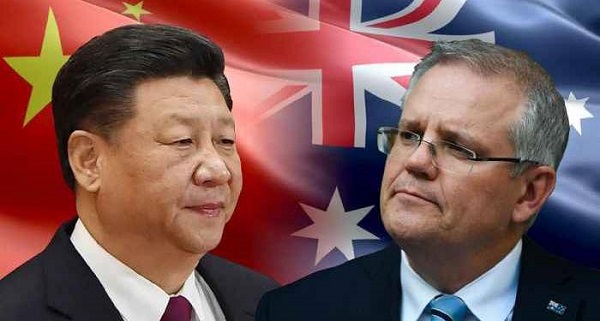
Photoshopped, of course.
Two Australian companies are setting up the break the Chinese monopoly by setting up graphite processing facilities for batteries here and in the USA. The Australian plant is planning to supply Germany. The Japanese are also lining up to buy the stuff from somewhere other than China.

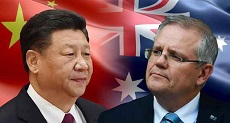
You wouldn’t believe how long that took. Seemed simple, just stitch a few items together…
Yes, indeed. A researched article takes real commitment.
Not sure a shallow smartarse with a loose tongue is the sort of leader we need to handle with the Chinese relationship at the moment.
A friend of mine with a different view on a raft of things had these things to say on China and the decline of the US:
“Germany is worried. Its exports to China have fallen away. The reason: China now makes everything it used to import from Germany. Think about that. China is no longer even an “emerging power”. It is now a fully fledged First World Superpower. And all this in 30 years!
Hong Kong was America’s (& Australia’s) Saarland, where Hitler moved the Wehrmacht in and everyone just watched. This inaction will only embolden Xi to try his luck with Taiwan.” AND
“West Jerusalem is happy. Israel looks around itself and sees the detritus of empires as far as the eye can see. It’s preparing for life after the latest (American) one. Netanyahu is doing as he should, as an Israeli PM. However, what the hell is Trump doing? He’s POTUS. He shouldn’t be wasting his time bolstering a foreign nation’s future! He should be safeguarding America’s future. If the tables were turned, Netanyahu wouldn’t give America the time of day. Israel is building its lifeboat against the (imminent) day when the US dollar loses its reserve status and America looks like Yeltsin’s Russia. (Noam Chomsky once wrote that the USSR & the USA were remarkably similar.)
I wish Scott Morrison were bolstering Australia’s post USA economy with the same fervour that is driving Netanyahu.”
China may try to solve its foreign exchange by turning the Renminbi/yuan into a reserve currency. Seem to recall the Chinese encouraging contracts to be set in Chinese rather than US currency.
Your friend has a wide – ranging perspective, John.
There are many Countries that wouldn’t have their Sovereignty but for the USA, Australia and Israel to name just two.
From all evidence I’ve seen China is only ever interested in its own and expanding that.
There has to be some gratitude from the free world toward America surely.
Sure, sure, America saved the world in WW2 along with the blood of Russian soldiers, and others.
John, your friend has plenty to justify his view, but I think a Biden presidency would make a difference. Biden doesn’t seem to be intimidated by people with real expertise.
It is a binary choice.
Germany made a lot of money out of exporting to China the tools it needed to manufacture stuff. A real leg up, which the Chinese are smart enough to build upon.
Not convinced the China set up is smart enough to yield innovation, it prefers, it seems, stealing them.
That’s nowadays, not back centuries.
Ambi: “Your friend has a wide – ranging perspective, John.” I get a steady stream of different perspectives from him. On the other hand we can’t agree on whether renewable ammonia or renewable methanol makes more sense as a transportable, renewable fuel. (We may both need to concede liquid hydrogen may be smarter than either.)
It’s only one data point but my cardiologist looks to his Chinese colleagues for the latest innovations. (Much to my surprise. I thought it was the Germans who led the world in medical technology.)
And I’ve heard somewhere that the Chinese are at the forefront of quantum computing.
It’s looking as if Deng’s post-Mao changes, easing China towards the capitalist mide of production, back to the days of small private business, large private conglomerates, wealth accumulation by individuals, sending Chinese undergrads and postgrads to Europe, USA, Australia etc. has had amazing results….
If it’s theft, Jumpy, is it just the “theft ” inherent in capitalism? Sharing of good ideas, corporations competing in technique, grabbing patents, crowding out competitors, influencing govts where possible; cronyism, innovation, tax avoidance, sweetheart deals with needy companies and needy govts, etc.
Or is it “theft ” because the CCP holds a political monopoly and builds the armed forces as its ultimate guarantor of maintaining power; and casts its spying widely? ?
Is it “crony capitalism “?? – other examples being Suharto’s Indonesia, Marcos’s Phillipines, Hun Sen’s Cambodia; any number of other instances in Africa, the Americas etc.
Brian
That phrase pour encourager les autres you quote, is one of the more chilling in the thought processes of rulers schooled on realpolitik .
“To encourage the others”.
Yes, kill enough citizens, and when all the others hear about it, they will most likely keep their heads down. I think all of us have heard of Chinese students or teenagers, who,hearing of Tiananmen 1989 (perhaps for the first time) ask their parents and are strictly told not to raise that matter, even inside the family home.
The parents, thoroughly encouraged.
The grandparents, many having witnessed the Great Proletarian Cultural Revolution circa 1966, 1967, most likely had more encouragement in a few years than most of the wretched of the earth endure in a lifetime. Encouragement is a hallmark of Leninist, Stalinist snd Fascist governments.
Bucketloads of encouragement.*
I can recommend a black and white film “Paths of Courage” involving good actors and the director Stanley Kubrick, who never amounted to much afterwards. The phrase “pour encourager les autres” is used in the context of WW1 trench warfare and a court martial.
* many years ago, a friend who had studied the Russian Revolution and Stalin’s life, told me “Josef Stalin started shooting opponents and then never stopped.” The inference being that, once started, the killings must continue.
Who killed more Russians? The German armed forces during WW2 or Stalin’s police and gaolers from the 1930s to around 1950?
Ambi, I think it’s a question very difficult to answer, but both a lot.
See Timothy Snyder Hitler vs. Stalin: Who Was Worse? and Ian Johnson Who Killed More: Hitler, Stalin, or Mao?
Jumpy, some time in 2019 I think China passed the US in the amount of research being done.
Before the kerfuffle this year I believe Australian universities had about 10,000 joint research projects pa with China, more than with the USA. I think that cooperation is going to crash, not least because the pollies in Canberra will want their spooks to clear all projects under the latest security legislation.
The other aspect of China – which I repeatedly fail to comprehend – is how layers of meaning, tradition, and historical precedent are built into their culture and their very language.
Not only Confucianism, important as that is.
Buddhism.
Aesthetics.
Science.
And that realm where aesthetics meets language: calligraphy.
For anyone with the perseverance to have a crack at a long biography, I recommend “Simon Leys. Navigator Between Worlds” by Philippe Paquet.
Simon Leys/Pierre Ryckmans found a worthy biographer in Paquet. ‘Simon Leys’ was a writer’s pseudonym.
This Leys bloke understood China better than most Belgians, better than most Europeans, Americans or Australians. He detested the crudity of Mao and the heirs of Mao and published scorching polemics against their rule; he made a home in Australia with his family.
Agreeing with Ootz from a few months back, I think we can get accurate glimpses of China, foreign as it is and must remain; and Pierre Ryckmans is a very good guide.
Ambi: “The other aspect of China – which I repeatedly fail to comprehend – is how layers of meaning, tradition, and historical precedent are built into their culture and their very language.”
I suspect the Chinese fail to comprehend it either. They may understand and accept the rules that they have to live with but may not understand why the rules.
Sometimes looking at a very different culture allows you to better understand and change your own culture. For example, the Davidsons found Aboriginal culture extremely different. One of the side benefits was that it showed us that we didn’t have to do things the way we assumed they had to be done.
We found Aboriginal culture made more sense when you asked yourself what was needed culturally for a small group of people with unreliable food sources and a high potential for inbreeding to do.
Looking at China one might ask what sort of government is needed for a very fertile country with very large catchments and a need for extensive flood levees and irrigation and Mongols with a penchant for invading. A god emperor like Chairman Mao that the people who really govern the country get their authority from is not particularly stupid.
If you think Chinese just steal technology, take a look at this:
It comes from a CSIRO article Global vision for ‘green steel’ :
The vision for a cleaner, greener and more productive steel industry, moved a step closer with the recent signing of an agreement with a company in China to scale-up CSIRO’s dry slag granulation (DSG) technology.
Molten slag is spun out into droplets and cooled to be used in cement manufacture. ©
Ten years in the making, DSG is smart Australian technology that harvests blast furnace waste and converts it into a granulated product to make cement – saving water, heat energy and greenhouse gas emissions in the process.
An agreement, signed in March 2015 by CSIRO and the Beijing MCC Equipment Research & Design Corporation, paves the way for the industrial scale demonstration and introduction of the DSG technology.
CSIRO Director of the Mineral Resources Flagship, Jonathan Law, hailed the agreement as a landmark for Australia-China research collaboration and planet-friendly steel production.
“Our collaboration is an exciting step towards the uptake of an innovation with real prospects of transforming the productivity and environmental performance of global iron smelting,” Mr Law said.
“If all steel production on the planet used dry slag granulation each year it could save the equivalent of 14 per cent of Australia’s energy use, 10 per cent of the nation’s greenhouse gas emissions, and enough water to meet a quarter of Melbourne’s residential water need.”
That was back in 2015. I wonder how that co-operation is going now.
China is pushing hundreds of thousands of Tibetans into forced labour camps ‘to reform their backward thinking’.
– a headline story in Nine newspapers.
Every person has ‘human rights’; yes, even a Tibetan.
What would Confucius, or a Taoist sage have to say about “forced labour camps”?
Just when commentators are praising the post-Mao modernisation of China under Deng, and his successors; the rulers revert to Mao impersonation.
Time for “the Chinese people to stand up!”
What say you, Malcolm Turnbull and Kevin Rudd?
Mr A, it’s fine apparently, Xi just “ said “ they’d be CO2 neutral by 2060.
If you can believe that.
Mr J
I find it bleakly amusing, that when younger Chinese started using (Disney version) images of Winnie The Pooh to stand for Xi who must be obeyed, such images were banned in China (social media under socialism ).
A dear Leader who resorts to such censorship reveals his weakness rather than his strength, in my view.
Lam Poo Ning rules! !
Ambi: “A dear Leader who resorts to such censorship reveals his weakness rather than his strength, in my view.”
China’s reaction to various comments by Australian governments and ABC reporters reinforces this view. However, what we may be seeing is underlings who are scared of their dear leader t the point of not wanting to be see tolerating criticism of their dear leader.
Hard to say what the dear leader thinks. But I think current Chinese behaviour is not in Chinese interests.
I think current Chinese behaviour is not in Chinese interests.
Agree, John, but likewise our behaviour has not been in our best interests either.
Shaun Micalleff tonight pointed out that in the media/journo tit for tat, the first tit was from us when we investigated some Chinese person who was thought trying to influence some NSW Labor politician.
I did not follow that one closely, but it seemed like casing shadows.
There was a similar tit for tat on American journalists, also not started by the Chinese.
Well, the Labor politician made public statements echoing the Chinese Govt position. Which was one of the actions Mr Dastyari was forced to resign over.
Yes, he had Chinese persons paying some of his bills. But he also echoed the Chinese Govt script on the artificial “islands” in the South China Sea; directly countering ALP policy.
Both major Parties are becoming more attuned to this “foreign influence”. Would it be OK for a federal Minister to take cash from a French company that wanted to build submarines for us?? (Hypothetical example)
Ambi, with the greatest respect, this had nothing to do with Dastyari, which was ancient history.
See Australia revokes Chinese scholar visas and targets media officials, prompting furious China response.
China indicates why Australian is detained.
Aussie spying on Chinese diplomats’ communications ‘stupid move’ .
This is where it appears to have started:
The Xinhua report alleged Australian intelligence agency staff searched the homes of Chinese journalists in June, questioning them for several hours and removing their computers and mobile phones.
The Chinese embassy in Canberra described the reported raids as “quite concerning”.
“We have provided consular support to Chinese journalists in Australia and made representations with relevant Australian authorities to safeguard legitimate rights and interests of Chinese citizens,” the embassy told AAP.
The ABC reported the ASIO and AFP raids were part of an investigation into alleged foreign interference linked to former NSW Labor political staffer John Zhang, who was a member of a WeChat group with two Chinese scholars.
The visas of the two Chinese scholars had been revoked, the ABC said.
So it started back in June. Then there was Cheng Lei, then Birtles and Smith leaving China.
Only after that did we find out what happened back in June. It involves a staffer to a NSW state politician, plus a couple of academics.
On the surface, that seemed OTT and provocative to me, but I don’t pretend to know.
Mr Dastyari wasn’t involved.
It looked to me as if the circumstances of both politicians were similar.
Not identical, of course.
What other foreign influences can there be? A foreign study tour for an Aussie pollie paid for by an embassy or a corporation or a friend?? Wasn’t Mr Fitzgibbon involved in that? Pollies wined and dined and passing on tidbits to diplomats…..
NSW pollies banned from taking donations from property developers. Then some do. Many resign.
You’re right, Brian, that we didn’t hear about the ASIO/AFP raids until months later.
But the concerns about John Zhang and the NSW MP he worked for, were reported as front page news earlier. All sorts of allegations and suggestions were made by journalists.
It seems those reports may have been based on briefings from police and intelligence agencies. I too have no idea what pertinent facts have been established, or what suspicions exist in those organisations. But I’ll watch any court cases, or Party decisions about the MP, with interest.
Occasionally, intelligence officers are suspected of posing as journalists, trade officials or diplomats. Not new.
Then there’s the recent kerfuffle about a SA Liberal MP.
That instance involved aggrieved exiled Uighurs.
From “The Australian”, 28th August 2020
A South Australian Liberal MP has had close and frequent contact with a Beijing-backed organisation that denies any persecution of China’s Uighur ethnic minority and that security experts have linked to the Chinese Communist Party’s international propaganda arm, the United Front Work Department.
Liberal MLC Jing Lee, who serves as Assistant Minister to Premier Steven Marshall, has enraged SA’s Uighur community by championing the Xinjiang Association of SA, whose operations are closely intertwined with the Chinese consulate-general in Adelaide.
Ms Lee has emerged as a major supporter of Beijing within the SA parliament, warning fellow Liberal MPs against meeting with the banned group Falun Gong for fear of offending China and also speaking at a consulate-general function in Adelaide in 2017 promoting China’s One Belt, One Road initiative, where she urged SA to do as Victoria has done and sign on to the controversial infrastructure program.
My take is that neither China or Australia have handled this conflict well.
On our side we need a better thought out bipartisan approach that understands what we should be trying to do and how we should go about it.
Ditto for China. Time they recognized that great powers cop a lot of criticism and ignoring the irritations from minor fish makes more sense than being thin skinned.
What is happening at the moment is not godd for either side
Haha, bipartisan CCP, novel concept.
Good luck with that.
Jumpy: There has been bipartisanship re foreign policy in the past Jumpy. I would have said we were fairly bipartisan re china at the moment.
Federal Labor are trying to be critical of the Govt without making things worse with China. That won’t please everyone.
Ambi, I have a feeling that Labor was a bit quick on the draw in distancing from John Zhang.
My son, Mark, isn’t impressed with Jodi McKay as NSW Labor leader.
I really don’t know enough, so like you I’ll wait and see.
Jumpy
“bipartisan” refers to internal Parties.
If the Coalition and Labor maintain a ‘bipartisan’ approach to an issue, that’s between them.
As John points out, that has usually been the case with foreign policy. (Note: ‘usually’, not ‘invariably’).
The only Australian Party I’ve heard of that had policy closely mirroring the CCP was a tiny group, generally called “Australian Maoists” and formally titled
the Communist Party of Australia (Marxist-Leninist)
CPA-ML
which has dwindled away….. almost to zero.
/obscure Left history
Mr A
>blockquote >Jumpy
“bipartisan” refers to internal Parties.
Yes, I’m aware.
What I found funny was John suggesting the One Party State of China also act in a bipartisan way.
It went over everyone’s head unfortunately.
I’ll try to state things more overtly in future.
Grr sorry.
From Richard Baker in Nine newspapers, on Premier Andrews…
Victorian Premier Daniel Andrews last year asked the Chinese government to set up a technology research and development centre in Melbourne, prompting warnings about intellectual property theft and the potential national security implications.
Mr Andrews’ request for a so-called “torch centre” to be set up in Melbourne was part of his attempt last October to court Chinese investment and which saw him describe Victoria as “China’s gateway to Australia”. The offer was made in a letter sent last year to China’s Minister for Science and Technology, Wang Zhigang, and followed up in person in a meeting between the Premier and vice-minister Huang Wei in October last year.
Torch centres in China bring together universities and high-tech start-ups with the aim of fostering innovation. They have been crucial to China’s rising fortunes since 1988 and the Chinese government credits them with contributing almost half of China’s patents and 11 per cent of its gross domestic product. The University of NSW already hosts such a centre, but risk analysis group Foreign Brief says they have also been linked to China’s potential acquisition and development of “grey area” technology that could include military use.
(other comments follow…..)